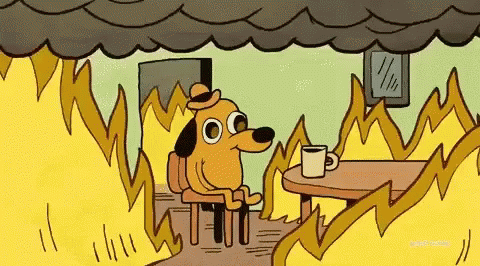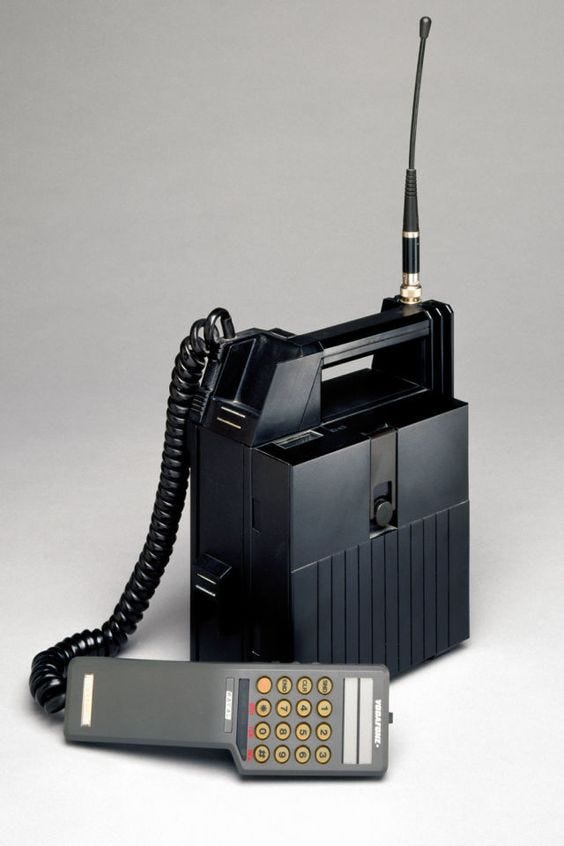"This is Fine" says HR as AI takes their jobs.
Why passive optimism could doom the future of HR.
Welcome to FullStack HR, and an extra welcome to the 102 people who have signed up since last week.
If you haven’t yet subscribed, join the 5800+ smart, curious HR folks by subscribing here:
Happy Friday 👋🏻!
Today's article will be a bit shorter since it's "Höstlov" (autumn break) here in Sweden. Like spring break but during fall. (This break, by the way, is semi-related to today's article - it stems from when we were farmers in Sweden and needed to harvest the potatoes before winter.)
Anyhow, we're not picking up potatoes, but I'm off with the kids, at least. If you listened to me in Paris, you'll probably nod every now and then while reading this.
I'm not trying to be a doomer in this one, but there's always this fine line between being a doomer and gloomer or being an optimistic yet a bit concerned HR dude.
I'll try to walk that thin, precarious line today.
Let's see how it goes.
BTW, I got access to my own “professional” voice from Elevenlabs, so if you want to listen to “me” but really not “me”:
Click here to listen to this episode on Spotify or Apple Podcast.
(I think it’s scary good and that it would easily fool someone over a semi-sketchy phone line.)
This is one of my favorite memes of all time.
And it perfectly captures the sentiment I'm hearing from a lot of HR folks regarding AI. At conferences and podcasts, the prevailing attitude seems to be, "Eh, we'll be fine. AI is just creating new opportunities for us" or "We'll just be augmented by AI and do our jobs even better."
I get where they're coming from. The idea of being fully replaced by AI sounds scary and far-fetched. But I think we're really underestimating how quickly AI capabilities are evolving. ChatGPT isn't even a year old yet - we're still in the early "carrying a briefcase cell phone" stage of this technology.
The truth is, AI won't suddenly replace all HR professionals on some marked calendar date. The shift is already happening gradually. When LinkedIn and StackOverflow recently laid off employees, they cited AI improving efficiency as a reason.
This trend will likely continue and expand, if not now, then later, to HR.
Now look, I'm not trying to be all doom and gloom here.
I'm genuinely optimistic about how AI can enhance our capabilities. But I also think we need to be realistic. If current trends continue, AI will deeply impact the way we work, perhaps even the meaning we derive from it. That's not a world-ending catastrophe, but it's not something to just shrug off, either.
Whereas shifts like the agricultural revolution unfolded across millennia and the industrial revolution took generations, recent transformations powered by computing and AI have occurred in just decades. The pace of progress only continues to increase.
Consider that electrification spread in 30-50 years, mass production matured in 30-40 years, and the computer revolution took 30-40 years. Now compare that to how quickly AI has evolved from early experiments just 10 years ago to sophisticated systems like ChatGPT today.
We are witnessing compressed transformation that took previous eras lifetimes to unfold. This urgency places immense responsibility on institutions and leaders to guide the AI-powered future of work in a considered, ethical, and humane direction.
We cannot casually expect progress to happen smoothly without conscious effort, as it rarely has throughout history. And the margin for error is slim given the breakneck speed of change. The time to be proactive is now.
Some say, "Historically, we've adapted to technological change, so we'll adapt to this too." That's true to an extent. But previous economic shifts, like the transition from an agrarian to an industrial society, came with plenty of social upheaval. As farmers moved to cities to work in factories, things didn't instantly improve for them. It took a long time of awful working conditions and labor organizing before protections like minimum wage and workplace safety standards were established.
My point is progress never happens smoothly without conscious effort.
If we want to steer our AI-powered future of work in a humane direction, we can't just sit back passively and expect it to work out. The more proactive we are about shaping the path forward, the better the outcome will likely be.
I know some techno-optimists think AI will solve all our problems, while techno-pessimists fear it will destroy us. The reality will likely be somewhere in the middle - AI won't kill or save us, but it will impact us profoundly.
How exactly it impacts us depends on the choices we make today.
If you care about cultivating meaning, dignity, and security through work, now is the time to lean in. Don't come running ten years from now asking, "How did we end up here?" when you could have helped guide the way.
The future is unwritten, friends.
Let's work together to write a good one so we don’t end up like that meme.





